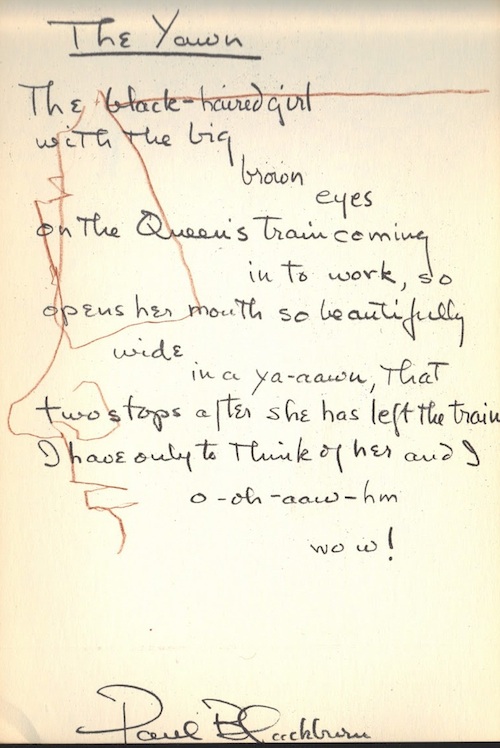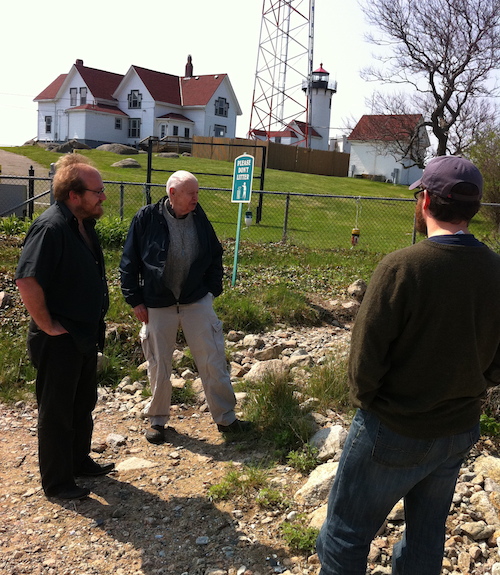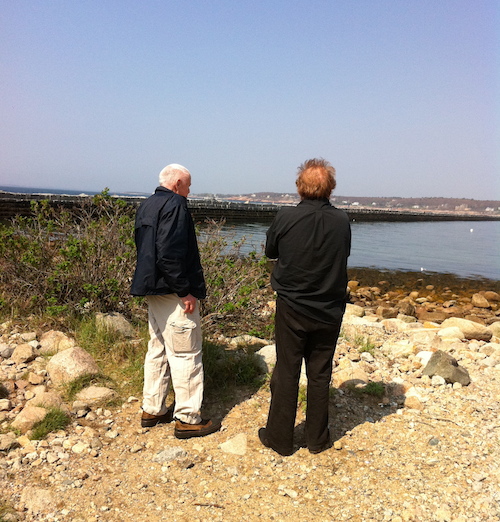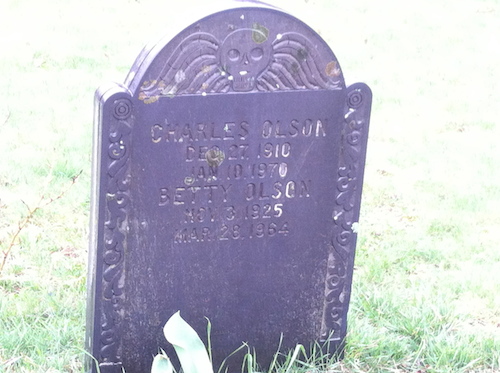T H E D I S T A N C E S and / or C I T I E S (2)

Paul Blackburn is arguably the quintessential mid-20th century poet of Manhattan. As Jed Birmingham, co-editor with Kyle Schlesinger of the terrific zine-on-small-press-zines Mimeo Mimeo, remarks when considering the scene of 1950s/1960s New York City, "the poet I most associate with that time and those places is not Frank O’Hara or Ted Berrigan, but Paul Blackburn." Reading a Blackburn poem provides a direct line to the talk, the very atmosphere coming straight from out another era. It's a glimpse of a different time and place of that city's locale where today we still walk through "Blocks of afternoon / acres of afternoon," as he says in the classic baseball poem, "7th Game : 1960 Series" where he also exclaims:
"What a nice day for all this !
Handsome women, even
dreamy jailbait, walk
nearly neglected :
men’s eyes are blank
their thoughts are all in Pittsburgh"
Of course the reference to young women as "dreamy jailbait" is likely to get Blackburn in hot water pretty quick with contemporary readers. I wouldn't argue for reading around the flagrant sexism but also hope it wouldn't stop anybody either. Blackburn's poems are often nothing more than a transcription of Blackburn's roving eye, think of Emerson's "transparent eyeball," and his accompanying thoughts, reflections and the like. In accomplishing this, the poems instantaneously capture a moment of action, whatever it may be, including all it entails which may be of most interest to Blackburn. Any poem is always passing through the medium of the individual poet. Even Jack Spicer's "aliens" after all are stuck with whatever furniture is to be found at hand in the specific imagination of any given poet.
Poet Ron Silliman points out that while Blackburn was "very much a man of the 1950s when it comes to some of his attitudes toward women" nonetheless reading his work "you can learn an enormous amount about the possibilities of poetry." Silliman is emphatic in his astute appraisal: "I can read Blackburn’s poems repeatedly, just for the utter pleasure in watching / hearing a master at work." Take Blackburn's "Ritual VIII" where the repetitive moves, both in terms of finding its shape and repeating key words/phrases, make as if literal steps down the page which in turn are echoed by the closing image of "a can of old dutch cleanser with the same picture on it / and the same picture on that" image inside image, ad infinitum. I also love Silliman's memory of once seeing Blackburn during a reading at Mills College in Oakland, CA, I believe, where he "seemed to be continually juggling four objects at once: a beer, something from a flask he kept in his vest pocket, a cigarette & a doobie." The poet ever in motion mirroring his poems wherein, item by item, all gets taken into account.
The metrics behind Blackburn's lineation, how he spreads his poems across the page, and his deliberate spacing out of punctuation (note in the lines quoted above the extra space before the colon in "nearly neglected :") are ever precise. He's providing an exact indication, scoring the poem as it were, for the breath-stops required for voicing it aloud. This use of the page for patterning sound only becomes increasingly frequent and expansive with Blackburn's final poems, such as The Journals (Black Sparrow 1975). Many poets associated with this practice, such as Robert Duncan, Robert Creeley and Ed Dorn, are commonly identified under the heading of Black Mountain, a direct nod to Black Mountain College in North Carolina where they either taught and/or were students in the early 1950s under the institution's final rector, poet Charles Olson. Olson infamously penned the seminal essay "Projective Verse" (1950) which the older poet William Carlos Williams immediately sanctioned, incorporating large swaths of it into his own Autobiography to explain his poetic practice.
Joanne Kyger's poetry falls directly within this same lineage. Similar to Blackburn, however, her work suffered decades of lapsed critical recognition and public regard. Scholars have only in recent years began "discovering" her as a "Beat Woman Poet," a category which barely even pertains to her. After studying in Santa Barbara under the exemplar Hugh Kenner, Kyger began actively publishing and participating in poetry communities during the 1950s in San Francisco joining in the Sunday poetry gatherings "led" by Jack Spicer and Robert Duncan. After moving to Japan and marrying poet Gary Snyder (who she later divorced) she was at the center of the semi-mythic Beat Generation in India tour with mega-poet star Allen Ginsberg and his partner Peter Orlovsky yet rarely afterward was her name connected to this trip.
Though she's been put through the mill in terms of sexist neglect over the years, she's confronted the situation with admirable sturdy Buddhist humor. For the last several decades she's lived a fairly harmonious life in the semi-rural coastal community of Bolinas just north of San Francisco.
Kyger's poems offer a dead-on clarity, daily recording local and national news and events, dreams, annual trips to Mexico, and plenty of local, as well as celestial, gossip. I had the excellent fortune to study with her for a semester while a student in Poetics at New College of California. In her presence a calm conviction prevails, her energy is both an intoxicating high and endlessly inspiring. Kyger's poems, such as "he is cleaning the privet," deftly take charge as they move upon the page, with carefully indicating breath-stops while every measure arrives well balanced with quirky pith which is wholly Kyger's to own.
the green blooming branches fall - 'they're getting out
of hand' delirious and adorable what a switch
we perceive multiple
identities when you sing so beautifully the shifting
clouds You are not alone is this world
As I wrote reviewing her chapbook 2012 (Blue Press)
Kyger firmly believes in the poet’s reliance upon “breath” and the possibility of the page carrying over to the reader clear indications of how the poet intends the lines be sounded out. She opened the Poetics class I took with a heady exegetical, quite personal interrogation of Olson’s Projective Verse essay wherein he makes the explicit claim “the line comes (I swear it) from the breath."
Unlike Blackburn, tragically felled by cancer just when he was at the prime of his writing life, Kyger just turned eighty and has enjoyed decades of active writing. She's still going strong, her poetry is as precisely tuned as ever. Picking up right where About Now: Collected Poems (2007) left off, City Lights has just published On Time, Poems 2005-2014. This latest collection includes the poems found in 2012 and as with that chapbook, there's notably no table of contents, no index. The poems arrive presented in chronological order, forming a continuous tracking of Kyger's daily business, the regular affairs of her life transcribed into a transformational poetics. Her poems take advantage of what is commonplace, what's often seen as minor, the simpler seeming details of time's passage. "Watching it all go by as if owned by no one," ("Seeing the Old Year Out" December 30, 2012) Kyger weighs the ordinary spectacle with a lighthearted gravity that's nonetheless profound. Although, as she notes, "This sounds like a simple improvisation / but actually it's composed" ("Permission by the Horns") her work is phenomenally focused upon exactly what is at hand.
You don't really want to be "elsewhere"
when this here
is so perfectly loving
and familiar
("It's the Big Trip"
January 29, 2013
Anselm Hollo
April 12, 1934-January 29, 2013)
Both the reading and writing of poetry for myself long ago merged into one overlapping activity which is shared in a vast network of other voices, other sources that all together work at sifting through the endless material deposited around us by time and space. In On Time Kyger urges "Think of dream as autobiographical episodes" and embrace them as events full of potential, opportunities for "contacting ancestors / who send gifts of songs, / stories, / designs." ( "Old Bird's Dream April 30, 2013) The activity of writing is ultimately thus ever anything but lonely or isolating. Kyger, again, "...when has the present ever been singular?" ("Post Extinction" September 2014) Embracing the unfolding moment, full as it is of unexpected occurrences writing poetry is more than enough activity to occupy a lifetime of work.
Being a poet certainly doesn't feel as if it's about climbing atop the endless pile-up in the continual pursuit of being the next literary sensation or hottest Twitter handle. I've been lucky enough anyways to locate many friends and associates involved with poetry who provide support and encouragement against such self-aggrandizing tendency. It's not always a simple matter to keep everything in perspective but as the old adage says you do in fact live and learn. For instance, I always felt like having a "full-length" book of poetry published by a well established and respected small press would figure as enough of an achievement to satisfy any nagging crave after what proves to be the elusive satisfaction of accomplishment. Of course the experience of first publications varies widely and some folks end up catapulted to fame with awards galore from their first book. For myself however publishing a "full length" book came to feel not so different from my first chapbook and I think it proves a valuable lesson about how relative such matters in life truly are.
In addition to just truly being completely surprised and pleased with the fact of my book getting published, how the book itself turned out as an object to hold, etc one memorably moving experience it brought about was a mini-reading tour to Boston and New York. I caught a Friday night redeye flight to Boston and as promised poets Derek Fenner and Ryan Gallagher picked me up from Logan airport at whatever god awful early hour and we drove immediately north along the seaboard up to Gloucester. I'd barely met or spent any significant time with Derek or Ryan yet readily knew them as the duo behind Bootstrap Press who a couple years previous had published our mutual pal Micah Ballard's first book Parish Krewes. Ryan and Derek are among the many affable and generous folks in poetry I've been lucky enough to meet and come to know.
Derek and I had arranged that prior to my reading that evening in Cambridge with poet Bill Corbett, we'd take this trip to Gloucester. Although I previously lived a year in Boston along with several in southern New Hampshire I don't believe I ever made it to Gloucester, except possibly driving through with my family as a teenager. The locale holds special prominence in my imagination as Charles Olson made his home in Gloucester and it is outwards from there he launched his colossal Maximus Poems which have drawn me from the get-go, coming across them at random on the shelf at my undergraduate library. Making the trip all the more eventful, we were to spend the entire visit with the poet Gerrit Lansing as guide. Here's a photo Derek took of Ryan and myself standing with Lansing on a beach by the harbour.

We started the day at Lansing's home which is directly in view of the harbour and well within sight of Maximus landmarks, such as Stage Fort Park, with which I was readily familiar from having seen photos and read about time and again in the abundant amount of Olson material I'd pored through over the years. Lansing, who has lived in Gloucester for decades, knew Olson well. Standing in Lansing's home and meeting him face-to-face was as close to Olson as I'm sure I'll ever get. The fact we then headed out driving around Gloucester and soaking up various "Olson" sights, such as the old white clapboard upstairs apartment that was his former home mere yards from the harbour water is all rather unbelievable. We journeyed all around the harbour. Here's a photo of Lansing and I looking out at the harbour, roughly in the direction of another Olson landmark the Hammond Castle across the water to the south.

We did end up making it out to Olson's grave. Which wasn't something I had ever before considered doing, but I am glad to have visited it. He's buried with his second wife Betty under a tombstone decorated with a skull and angel wings motif I've seen often in New England cemeteries. Here's a photo poet David Hadbawnik has posted online:

The grave plot seems amazingly small for Olson's 6'7" stature and had a considerable sunken look, which again I've noticed in other New England cemeteries. Part of working within poetry I've always felt is a summoning of the dead. As Lansing's "How We Sizzled in the Pasture" puts it: "jug jug to hungry ghosts, / bursting open pearly gates." All us poets want in, while we're here, before we're there.
Patrick James Dunagan was raised a skateboarder in Southern California and became interested in poetry...
Read Full Biography

